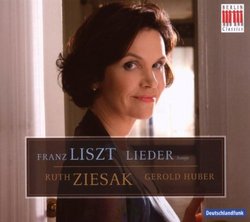| All Artists: Franz Liszt, Gerold Huber, Ruth Ziesak Title: Liszt: Lieder Members Wishing: 0 Total Copies: 0 Label: Berlin Classics Release Date: 8/12/2008 Genres: Pop, Classical Styles: Vocal Pop, Opera & Classical Vocal, Chamber Music, Historical Periods, Classical (c.1770-1830), Modern, 20th, & 21st Century Number of Discs: 1 SwapaCD Credits: 1 UPC: 782124162825 |
Search - Franz Liszt, Gerold Huber, Ruth Ziesak :: Liszt: Lieder
 | Franz Liszt, Gerold Huber, Ruth Ziesak Liszt: Lieder Genres: Pop, Classical
|
Larger Image |
CD Details |
CD ReviewsWhat was Franz Liszt like as a lieder writer? Juha K. Tapio | Oulu, Finland | 04/11/2010 (5 out of 5 stars) "On this CD, soprano Ruth Ziesak and pianist Gerold Huber make a rather compelling case (I think) for the lieder of Franz Liszt. Do Liszt's songs need defending? From the point of view of history of music, it seems so. In his time Liszt was heavily criticized for some of his musical output - including his lieder. The main wielder of the axe was the notorious critic Eduard Hanslick. He, amongst others, criticized Liszt's lieder of being rather formless and contrary to certain classical ideals and norms.
It is true that as a songwriter, Liszt lacked the forward driving energy and melodic gift of a Schubert or a Schumann. He tended more towards the lyrical and the introspective. The posterity has more or less appreciated Liszt's open forms and what is now largely seen as freedom from classical restrictions. His songs have influenced other composers, such as Gustav Mahler and Alban Berg, amongst others. The songs as interpreted here by Ziesak and Huber are all rather leisurely paced and filled with meditative silences. Yet this does not mean a lack of any intensity of feeling; Ziesak's warm, nuanced and expressive voice and Huber's pianism create a pool of sparkling magic in which the listener is quite happy to immerse himself once in a while (well, at least this listener). The 21 songs on this album were selected by Ziesak herself. They reflect Liszt's interest in German Romanticism and are based on poetry by various German poets of the 17th and 18th centuries, of whom Goethe and Heine remain the best known today. The emotional range of the songs is quite varied. They range from the mystical and dream-like Die drei Zigeuner and the operatic Loreley (based on the famous poem by Heinrich Heine) to the acerbic Vergiftet sind meine Lieder. At the core of the CD are four songs based on texts by Goethe, which seem to form a kind of spiritual centre for the CD. Of these, Mignon's Lied has also been set to music by many other composers (including Schubert). The very last song on the CD, O lieb, so lang du leben kannst, is better known as an arrangement for piano, `Liebestraum no. 3'. It is, in my humble opinion, one of the most beautiful songs ever written, a touching reminder of love's fragility. A wonderful CD, then, which should set a new light on our image of Liszt as a creator mainly of thundering virtuoso piano pieces and large-scale orchestral works. There is great and fragile beauty to be found here, and both Ziesak and Huber deliver it expertly. The notes by Dirk Stöve are excellent and illuminate the background of the songs from a musical-historical viewpoint. Alas, only German texts are provided, which means that to fully appreciate the songs you need some knowledge of German (which does not mean that you have to be entirely fluent in the language; a good dictionary will be of great help). " |

 Track Listings (21) - Disc #1
Track Listings (21) - Disc #1